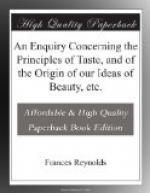But, though all truth resolves into one truth, one beauty, one good, as all colours resolve into one light; though the scientifical intellectual colours, classes, or leading principles of science, the physical, the moral, the metaphysical, &c. &c. resolve into intellectual light, beauty, or good; it is, I imagine, the moral truth, that is the characteristic truth of beauty: for, were we to analyse the pleasing emotions we feel at the sight of beauty, we should, I imagine, find them composed of our most refined moral affections; and hence the universal interesting charm of beauty. And, as those affections refine by culture, hence the different degrees of the sentiments which beauty creates in the rustic, and in the man of taste. The former perceives only the physical charm of beauty, the freshness of colour, the bloom of youth, &c. but, to the man of taste, the physical pleases only through the medium of the moral: the body charms because the soul is seen; beauty, in his breast, is the source from whence endless streams of fair ideas flow, extending throughout the whole region of taste, no object of which but is more or less related to the principles of human beauty. But taste, though a subject almost inseparable from that of beauty, I must forbear to enlarge upon in this chapter, as I propose to make it the particular subject of my next.
It is but at that period, at which we begin to perceive the charms of moral virtue, that we begin to perceive the real charms of beauty. It is true, a man may attain, by experience, the knowledge of its just proportions; without that concomitant sentiment. He may be unconscious of the characteristic moral charm resulting from the whole. And an artist, I imagine, by the habitual practice of the rules which constitute beauty, may produce forms which charm the moral sense of others, without being conscious of it himself; the utmost limit of the rules of the imitative arts being so intimately united with the intuitive principles of taste, or refined moral sense, that the mind in general cannot distinguish where the one ends or the other begins. The artist, who separates them, leans on the second cause instead of the first.
As the strongest proof that the moral sense is the governing principle of beauty, we may remark, that the human form, from infancy to old age, has its peculiar beauty annexed to it from the virtue or affection that nature gives it, and which it exhibits in the countenance. The negative virtue, innocence, is the beauty of the child. The more formed virtues, benevolence, generosity, compassion, &c. are the virtues of youth, and its beauty. The fixed and determined virtues, justice, temperance, fortitude, &c. compose the beauty of manhood. The philosophic and religious cast of countenance is the beauty of old age. Now, were any of these expressions misapplied, i.e. commuted, they would disgust rather than please: without congruity there could be no virtue; without virtue, no beauty, no sentiment of taste.




